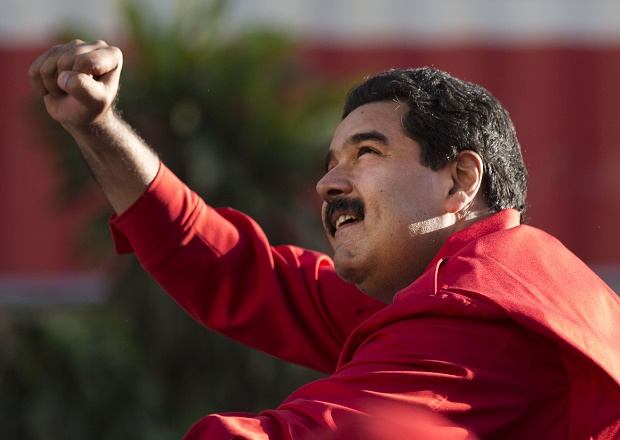
Venezuela’s President Nicolas Maduro gestures to supporters from the top of a car after the inauguration of cable car public transportation system, in the popular neighborhood of Petare, in Caracas, Venezuela, Tuesday, Dec. 1, 2015. AP File Photo
CARACAS, Venezuela—Venezuela’s President Nicolas Maduro will come face to face with hostile lawmakers threatening to oust him when he makes a state of the nation address on Friday.
At a key point in the political crisis rocking the oil-rich nation, the Socialist leader is expected to go before the state legislature for the first time since his center-right opponents took control of it.
READ: Venezuela sinks deeper into messy political crisis
They vowed to devise a way of booting out the mustachioed former bus driver as president this year, while he secured a Supreme Court injunction limiting their legislative powers to do so.
The institutional arm-wrestle threatened to paralyze the National Assembly legislature this week and heightened fears that the political rumpus could spill over into unrest on the streets.
READ: Players, strategies in Venezuela’s political crisis
Only last-minute compromises set the stage for Maduro to deliver his annual presidential report in the debating chamber. Under the constitution he had until Friday to do so.
The new speaker of the assembly, Henry Ramos Allup, a leading opponent of Maduro, said Thursday it would hold a “special session” to hear the address.
Maduro has yet to publicly confirm his appearance, but his communications team were making preparations for the address, which was scheduled for 2130 GMT.
Ramos said Maduro’s office and members of the assembly “have been coordinating… in order to ensure compliance with the protocol” surrounding the annual address.
Strategic ‘truce’
A day earlier, the opposition gave some ground in the power struggle. It bowed to pressure from the Supreme Court, which Maduro’s rivals say is controlled by his allies.
Three opposition lawmakers agreed to quit while the court investigates them over government allegations of electoral fraud.
“Sometimes truces are needed,” Ramos said in a television interview. “You have to sacrifice a part to save the whole.”
The court responded to that by lifting an injunction that had declared the assembly’s motions would be null and void if the three banned deputies took part.
The departure of the three deprives the opposition MUD coalition of a two-thirds majority.
That “supermajority” would have allowed the opposition to launch constitutional measures to cut short Maduro’s mandate, which expires in 2019.
Ramos said Wednesday that the MUD still aimed to do that, though its majority is cut to three-fifths for the time being.
“The government has the advantage of controlling the Supreme Court and is prepared to use that unreservedly,” said analyst Luis Vicente de Leon, head of the pollster Datanalisis.
“The assembly’s powers will depend on its performance.”
Maduro has accused the opposition of planning a “coup” against him.
The MUD won control of the legislature from the socialists in elections last month for the first time in nearly 17 years.
It has mounted the toughest challenge to the government since Maduro’s predecessor Hugo Chavez took office in 1999 in what he called a socialist “revolution.”
The opposition has vowed to rescue Venezuela from an economic crisis that has sparked soaring inflation and shortages of goods—Ramos says the economic policies inspired by Chavez have “failed.”